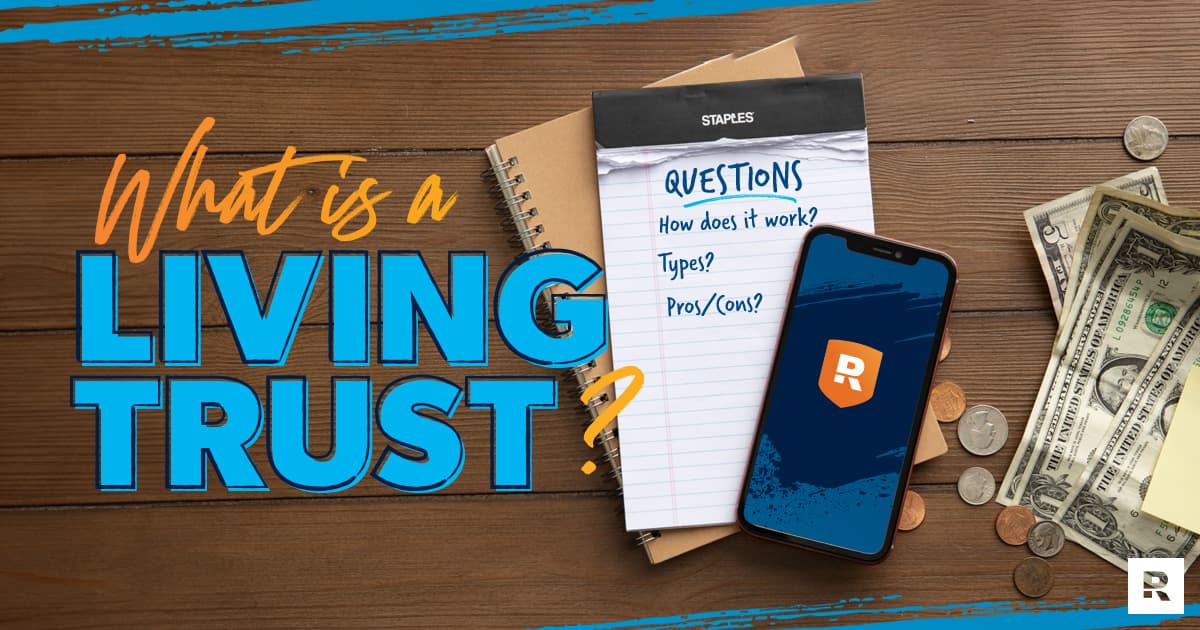What Is a Living Trust? (And Why You Might Want One)
11 Min Read | Mar 17, 2025

Key Takeaways
- A living trust is a legal tool for estate planning.
- You can make a revocable or irrevocable living trust, both of which will own your assets while you’re still alive.
- Benefits of a living trust include avoiding probate, protecting your privacy, and sometimes gaining tax advantages.
- Drawbacks to a living trust include the costs involved with attorney fees and the personal inconvenience since you don’t own your property anymore.
- Living trusts are ideal for people with larger or more complex estates.
A living trust is a legal tool that helps you manage and pass on your assets while avoiding the headaches of probate.
Save 10% on your will with the RAMSEY10 promo code.
So, you’re googling living trust now. Either you’re looking for a cheap sedative or you’ve decided to be intentional and get your crap together. If it’s the last one . . . proud of you.
We’ll walk you through what a living trust is, how it works, what it costs, and whether it’s a good idea for you.
Living Trust Definition
A living trust is the most common type of trust. A trust is a special kind of fund that can own someone’s assets. Think of it like a storage container that can hold your stuff until you or your loved ones need it. With a living trust, the container is filled while you’re still alive and all ownership is transferred to the container.
Since a container can’t think or do anything, a trustee is appointed to manage everything in the trust until it’s dissolved. Often, the person who puts their stuff in the trust names themselves as the trustee.
Terms to know:
- Grantor: the person who makes the trust
- Trustee: the person who manages the trust
- Beneficiary: the person (or people) who receive assets from the trust
Interested in learning more about estate planning?
Sign up to receive helpful guidance and tools.
How Does a Living Trust Work?
When you form a trust, your legal title is grantor (the one who owned the stuff originally). At that point, you transfer ownership of your assets to the trust itself.
Let’s pretend you own a piece of property—it could be your home or an investment property. If you have a living trust, you can remove your name from the deed of the property and put it in the name of the trust. From that point on, you wouldn’t own the property anymore—the living trust would.
You can do the same thing with the titles to vehicles, financial accounts, and anything else you want to put in the name of the trust. This process is called funding the trust, and the items together form a trust fund. Makes sense, right?
Next, you need to name a trustee to make sure the instructions in the trust are carried out. Maybe the trustee is a relative or even you. Or you could appoint a professional trustee, usually from a financial institution.
From the trust fund, you can leave an inheritance to your beneficiaries. You also have the power to require certain conditions that need to be met before beneficiaries can receive items from the inheritance (like a grandchild graduating high school before inheriting the car).
One of the big selling points of trusts is avoiding probate for your beneficiaries. Unlike wills, any assets you place in a trust don’t have to go through probate. Because the trust owns your stuff, it doesn’t belong to your legal estate when you die—so the court doesn’t oversee it. In your trust’s instructions, you can pass your assets directly on to your heirs.
Can You Change a Living Trust?
You can make a living trust revocable or irrevocable, depending on your needs. If you think you’ll want to change things later, a revocable trust is a good choice.
- Revocable trust: a flexible trust that can be changed
- Irrevocable trust: a permanent trust that can’t be changed (a revocable trust becomes irrevocable when you die)
An inconvenience of living trusts is giving up ownership and control of your assets. Even though you can make changes to revocable trusts, you still have to go through a process first.
Does It Protect From Creditors or Taxes?
Only an irrevocable living trust can offer protection from creditors because you give up all control of the assets. Taxes are more complicated. A revocable living trust does nothing to shelter you from taxes while you’re alive. But once it becomes irrevocable when you die, assets in the trust are taxed separately from your estate—which reduces your taxable estate. (For example, if your estate value is just above your state or federal income tax threshold, putting some of it into a trust could bring you below the limit and keep the whole kit and kaboodle from being taxed.)
Why People Use a Living Trust for a House
Houses are the number one asset placed in living trusts. They’re popular tools for managing and passing on houses because they offer:
- Quick, probate-free transfer
- A plan for management if you’re incapacitated
- Simplification of multistate property ownership
- Retained control while you’re alive
Any asset placed in a trust gets passed directly to the beneficiary, skipping probate. If you have property in multiple states, this is especially helpful because those assets would normally have to go through separate probate processes in their respective states. The living trust simplifies that and passes it all directly to the beneficiary.
Living trusts are also a way to set up a plan for what happens if you become incapacitated and unable to manage real estate. If you put your house in a living trust, you also appoint a successor trustee who can take over for you. They can collect rent, pay taxes, and repair or sell your home if needed.
But that doesn’t mean you have to have a living trust. They’re quite expensive to set up. And there are less costly ways to keep your house out of probate—like joint ownership where two people own a house (think spouse), a transfer on death (TOD) deed, or a beneficiary deed. A simple financial power of attorney can also do the same things a successor trustee would handle when managing your house.
Here's A Tip
A living trust can’t guarantee that your beneficiaries won’t have to go to probate court at all. If there are any assets left outside of your trust, like what’s often included in a pour-over will, those will still be subject to probate. But the probate process should be faster and easier because the bulk of your estate was in a trust.
How to Set Up a Living Trust
The best way to set up a living trust is to hire an estate planning attorney. They’ll draw up the necessary documents, make sure everything is legal, and design the trust to meet your specific needs.
Here are the steps to setting up a living trust:
Step 1: Choose between a DIY trust and one created by an attorney.
DIY is cheaper, but when it comes to something as complex as a trust, it’s best to let an expert create it for you to make sure it matches your situation and follows the laws of your state.
Step 2: Draft the trust document.
Hopefully you went with an attorney, and they’ll do it for you.
Step 3: Transfer assets (title changes, etc.).
Sign over ownership of the assets you want to put into your trust. That means changing the title on things like your house or car from your name to the name of the trust.
Step 4: Keep it updated.
Don’t forget to add any new assets to the trust if you want them included.
Grab Your Complete Guide to Estate Planning
Here's a sneak peek:
- Experts breaking down what you need
- Easy definitions for legal mumbo jumbo
- Education for every stage of planning
Before you hire an attorney, you need to figure out a few things. For example:
- Which assets do you want to transfer into your trust?
- Who do you want your successor trustee to be (the person who makes sure everything is transferred properly after your death)?
- Do you want your trust to exist alongside a pour-over will? (A pour-over will is like a catch-all that transfers any remaining assets to the trust when you die.)
- Who do you want to receive your assets after you die?
How Much Does a Living Trust Cost?
Generally, a living trust made by a lawyer will cost anywhere from around $1,000–4,000—but it can be more if your estate is very complicated. Online trust-making services cost less—as little as around $300–500. But if your estate is complex enough to need a trust, it’s probably also complex enough to need a lawyer’s expertise. Don’t cut corners with your estate plan. If you need a trust, get a lawyer to help you make sure it does what you want it to do.
Your actual cost for a trust depends on:
- The size of your estate
- The laws of the state where you live
- The complexity of the trust you want to make
Keep in mind, once you’ve established the trust, there will likely be maintenance costs as well. For instance, if you ever need to change something, you may have to pay for that.
Cost vs. Benefit
While it costs more up front, a trust can be worth that chunk of change if it saves your beneficiaries enough in probate expenses. In most states, probate takes roughly 3–7% of the estate value in fees, including court fees, lawyer fees and the executor’s compensation.
Let’s say you have a $1 million estate. You could go with a will, but would a trust be more cost-effective? If your estate is in California and you went with a will, your beneficiaries could face 4% fees for both probate attorney and executor compensation on the first $100,000, 3% on the next $100,000, and 2% on the next $800,000—for a total of $46,000, plus court fees and other potential costs.[1], [2] Unless you’re planning to do legal gymnastics with your trust, it shouldn’t cost anywhere near that much to set up. So in this case, a trust would likely be worth the cost.
Pros and Cons of a Living Trust
Living trusts are necessary for certain situations. In other cases, they may be optional, and you’ll just need to weigh the pros and cons.
|
Pros |
Cons |
|
|
Depending on your situation, a living trust could be the best way for you to set your loved ones up well when you pass away. If you’re not sure whether it’s the right fit, an attorney can help you make a confident decision and build your estate plan with peace of mind.
Will an online will work for you?
Find out if an online will works for you in less than 5 minutes.
Living Trust vs. Will
Knowing the difference between a living trust and a will should help you decide which one you need. Here are some key differences:
- A living trust helps you skip probate costs (but still comes with attorney fees). Any property given through the last will and testament is subject to probate. When handled through the living trust, it isn’t.
- A living trust is private, while a will is a public document. The probate process with a will includes publishing the creation of the estate and inviting creditors to make claims. With a living trust, you can avoid the public being notified. The trust document is also private, but anyone can view a will.
- A living trust can’t appoint a guardian for your children. Only a will can do that. So, if you’re a parent with young kids, you definitely need a will (with or without a living trust).
- A living trust takes more time and money to set up. There’s more paperwork—and money—involved in creating a living trust compared to a will.
Do I Need a Living Trust?
While there’s no one-size-fits-all answer, the vast majority of people can get by without a living trust. Unless you have a big estate or other complications, a simple will should work just fine. But if you think you need a trust, work with an attorney. A complex trust document for your estate plan is not a DIY job.
Whatever you decide, act now and make it official. Don’t be one of those people who think that if they make an estate plan, they’ll die. You’re going to die, but a will or trust makes it less of a worry.
If this article convinced you that a will is all you need for your estate, you can get one from the convenience of wherever you are right now through RamseyTrusted® provider Mama Bear Legal Forms. Their online will is legally binding and customized to the laws of your state. No need for a second opinion! But even if you do get one, it’ll pass the test—just like it did for Shanna K. from the Baby Steps Millionaires Facebook group.
“We used [the Mama Bear Legal Forms will-maker] and had a great experience,” she said. “We’re blessed to have a good friend who is an attorney for exactly those things. She reviewed [the documents] and said they were all perfect. HIGHLY recommend it!”
Maybe you’re not quite ready to jump directly into making your will. That’s understandable! If that’s how you’re feeling, here are a few action steps to consider.
Next Steps
- Use these six steps to get started estate planning.
- Still unsure whether a will or a trust is better for your situation? Check out our deep dive into wills versus trusts.
- Take our quiz to figure out whether an online will works for you.
- Start your online will with RamseyTrusted provider Mama Bear Legal Forms.





